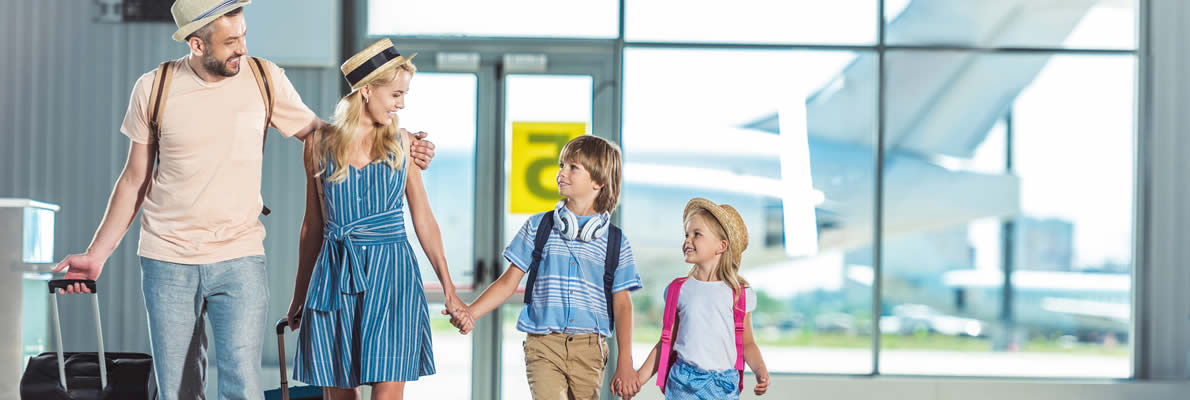Travelling with children and medicines on board: here are the rules of our airline

Your suitcase is packed, your documents are inside your backpack along with the book you are reading, and you are longing to set off. This time, however, flying will be different flight to all other times in the past, because you will going on board with a special passenger, your child!
If you are travelling with a child we suggest you read this section of the site dedicated to children: there is a lot of information that may be useful.
It is indeed possible to fly with your children and not go crazy chasing them all over the plane: some organisation is required, lots of extra pampering and above all some special strategies that we talk about here.
Is this the first time your child is travelling by plane with you?
Ask for their First Flight Certificate to make this moment special. Newborns – “babies” –, under two years old at the time of your flight, travel at a special rate without occupying a seat.
Logically, babies can only fly with Albastar accompanied by an adult, that is a person who has turned eighteen.
Of course children can fall ill during holidays: it is important to know what medicines to take with you!
Perhaps, before your child was born, you didn’t even take headache tablets with you, but now that you have a baby, your needs have almost certainly changed and the idea of being abroad without any medicines is certainly far from appealing.
So, even if you are a parent who loves travelling “light”, we recommend that you set off well informed about what you can and cannot pack in your suitcase.
The first question that arises is: can medicines be carried in hand luggage?
There is good news regarding medicines in hand luggage! With our airline you can:
- transport them with you on board
- put them inside your backpack without having to use a resealable transparent plastic bag, as long as the medicines are not liquids. It is always best to keep them in their original packaging, so as not to lose the package insert and to ensure they are immediately recognisable.
However, there are some rules on transporting medicines that you need to know before departing in order to pass security checks.
If your child needs to take medicines during a flight, you must have a medical certificate in English stating that you need to carry the relevant medicines with you.
Liquid medicines in syrup or drop forms should be carried in 100 ml containers without exceeding a total of 1000 ml. They should be placed in a resealable transparent plastic bag together with the package insert.
However, there is an exception to this rule: we refer to Commission Regulation (EU) no. 185/2010 of 4 March 2010, which states that there is no limit on liquids if they:
- must be used during the trip and are necessary for medical purposes or for a special diet, including baby food.
Pay particular attention as medical prescriptions for medicines to be carried on board must be issued less than a month before your flight. The prescriptions must include:
- name, surname and date of birth of the person taking the medicine
- the doctor’s name, surname, professional qualification, professional address and signature
- details of the medicine: generic name and not the trade name, which is not necessarily the same abroad, quantity, concentration and dosage.
If you have any doubts regarding the list of medicines that can be taken on board, we suggest you talk to your family paediatrician. Who better than your family paediatrician to advise you which medicines to take based on your destination and duration of your trip?
A pharmacist can tell you which medicines require medical prescriptions in case you need to buy them while you are away from home.
Please remember that there are medicines, such as insulin, that cannot be transported in the luggage hold, since low temperatures may compromise their effectiveness.
Here is an essential list of medicines to have when flying with children.
It goes without saying that the choice of medicines should based on the destination of your trip and customised to the specific needs of each child: for example, if you are setting off to the beach, an ammonia-based product could be useful in the event of an unpleasant encounter with jellyfish.
You should take:
- an antipyretic against fever
- an antihistamine for potential allergic reactions
- travel sickness medicine
- a disinfectant
- a box of plasters
- a thermometer
- cough syrup
- a cream for small traumas
It can happen that a medicine you usually use is not authorised in the country you are travelling to.
In such cases, extra care needs to be taken, since any such medicine may only be brought on board under certain conditions: we suggest you inform the competent authority before departure that your child needs that medicine.
Please note that you will need, even in this instance, a medical certificate stating that the medicine needs to be taken.

